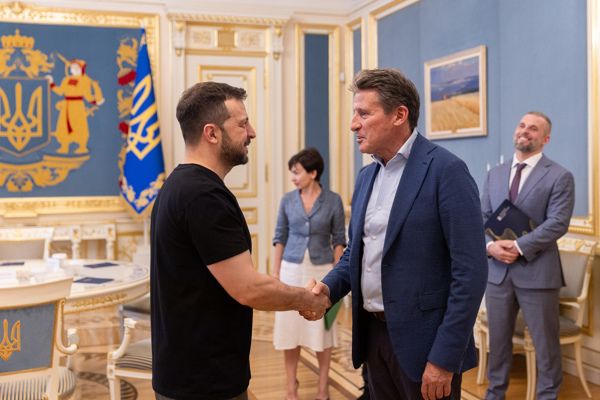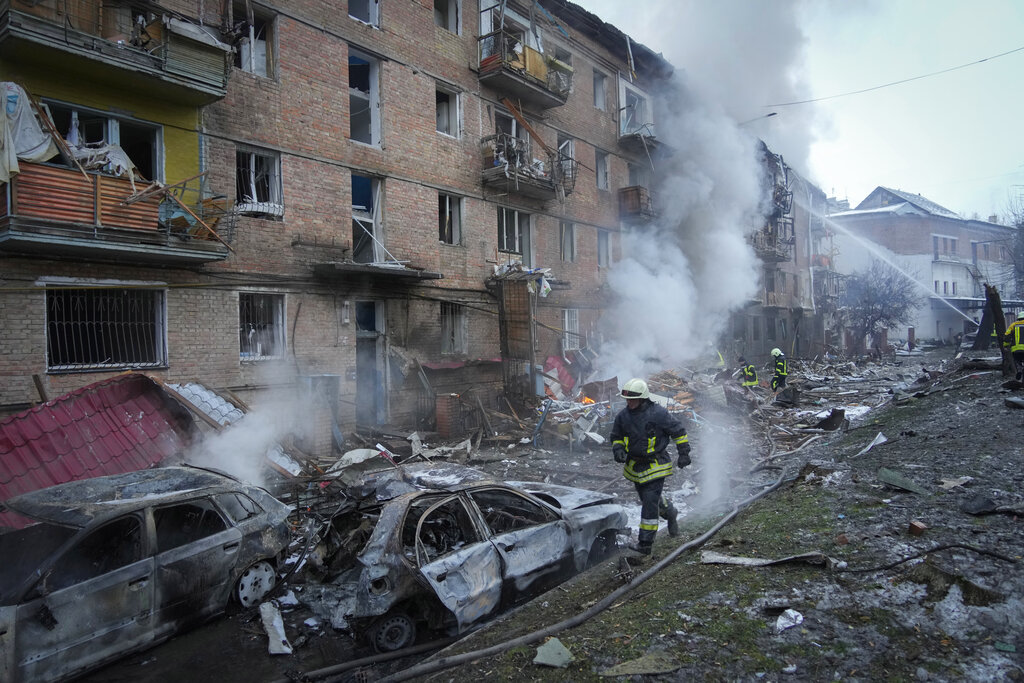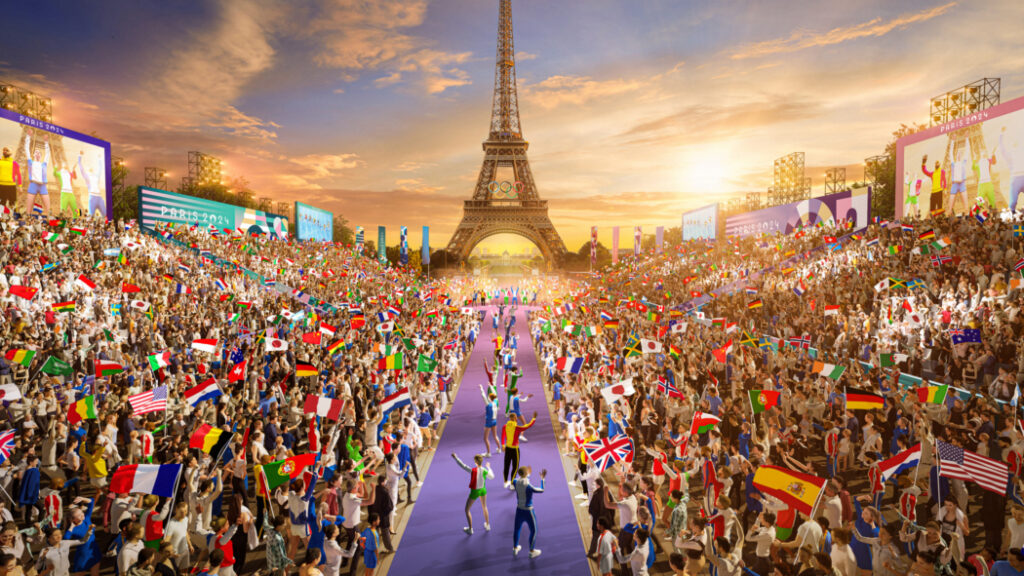Russia faces day of reckoning in world sport after threatening ‘Perfect’ Paris Olympic Games
July 19, 2024
Olympic Games advisor Michael Pirrie says Putin’s attempts to sabotage the Paris Games may have a long term impact on Russia and world sport.
“The horror of it (the war) was everywhere…there are only losers and they are families…All we can do is make a stand…” – World Athletics President, Seb Coe, on a recent visit to Ukraine to meet athletes and President Volodmyr Zelensky
Few events can challenge the character or capacity of a city like hosting the Olympic Games, the world’s biggest event and piece of project management.
The Summer Olympic Games is not just big, its bigger than you can imagine an event to be – like simultaneously staging 32 world sporting championships or five FA Cup or Super Bowl finals every day for 16 long consecutive days, along with opening and closing ceremonies, the world’s biggest live productions.
As well its enormous scope and complexity, the Paris Olympic Games must be “impeccable,” according to French President, Emanuel Macron.
“Our organisation of the Games must be flawless,” Macron declared while touring a high-performance institute for sport and meeting athletes in Paris earlier this year.
Delivering a perfect Olympic Games event and experience is made even more difficult in a region wracked by war in Ukraine and political division in the host nation, along with wider geopolitical unrest and violent conflict in the Middle East beyond.
The logistics of staging the world’s most important sporting occasion have become even more challenging as Russia turns its weapons of war onto Games organisers in Paris.
After scrambling to rescue his presidency, his party and nation from the extremist far right and political gridlock, Mr Macron has been clambering to protect the Olympic Games from attempts by Russia’s war merchant president and mass murderer, Vladimir Putin, to sabotage the Olympic spectacle.

This follows a surge in Russia-linked cyberattacks and propaganda operations intended to undermine confidence in the security, safety and preparations for the Paris Games.
The most recent attempt is believed to involve the creation and spreading of fake news content claiming the Paris Games may have to be delayed due to the unresolved French legislative elections.
The sabotage campaign against Paris is believed to involve Kremlin linked hackers and Putin backers using a variety of methods and technologies to spread disinformation and uncertainty about the Games
“Every day (Russia) is putting out stories saying that we are unable to do this or that so (the Games) will be at risk,” Macron said recently.
Russia’s sabotage campaign has targeted senior Olympic leaders, including IOC President Thomas Bach, and World Athletics President, Seb Coe.
Both Bach and Coe have been targeted in disinformation campaigns after restrictions were placed on Russian teams and athletes at the Paris Games and world sporting championships following the invasion of Ukraine.
The sabotage efforts are believed to be a part of a wider campaign by Putin to destabilise world sport, according to Russia watchers.
This has involved repeated attacks on the credibility and authority of world sports governing bodies and leaders.
The Russian dictator has attempted, in particular, to override the IOC and World Athletics and determine how athletes from Russia participate in Paris.
While Putin has demanded his athletes compete fully identifiable as Russian, the Russian Tennis Federation President, Shamil Tarpishchev, said that independent neutral athletes would still be known by everyone as Russian, even without symbols of national identity.
Respected senior IOC member and Olympic Order recipient, Sir Craig Reedie, was believed to be the target of an earlier Kremlin plot intended to rock world sport.
The plot involved a conspiracy to poison the leading British Olympic administrator, according to UK security officials, and send a message to those investigating Russian athletes and sports governance.
Reedie was targeted after overseeing investigations by WADA that revealed extensive secret doping operations involving the Kremlin and providing athletes with banned performance enhancing drugs to win more medals for Russia.
The plan to poison Reedie is thought to have involved one of the Russian spies who had previously attempted to poison a former agent, who had been living in the English cathedral town of Salisbury, with a potentially deadly nerve agent.
The Kremlin’s campaign to destabilise the Paris Games is directed also at the French President after Mr Macron advocated a more direct interventionist approach in Europe’s response to Putin’s apocalyptic war.
This has included possible troops on the ground in Ukraine to support the devastated nation and guard nearby national boarders from further possible Russian attack, which angered Putin.
Putin’s sabotage mission is also in retaliation for having to surrender the Olympic stage he covets to leading western Olympic nations supporting Ukraine, including US, France, UK, Germany, Australia and others.
Russia’s attempts to undermine Paris have heightened security concerns further in the final countdown to the Games Security experts and officials in France are updating, installing, and activating sophisticated digital defence and surveillance systems in an unprecedented operation to protect the Games.
This includes measures to counter cyberattack operations designed to hack and destroy computer systems and data linked to Paris Games venues, competition systems, energy supplies, and Olympic teams from western nations supporting Ukraine with weapons, training and economic support.
NEW ERA OF SUPERPOWER SPORT & POLITICS
The unrivalled security environment surrounding the Paris Games heralds a confronting new landscape for international sport.
This involves the cross over of covert cyber security, espionage, spying and other military style operations into international sports settings by nations like Russia that see sport and the world differently.
This includes the pursuit of national agendas and goals that clash with long standing values of sport and rules of law established in international society.
The attempted sabotage of the Paris Games is part of a new era of superpower sport and politics, centred currently around the ‘No Limits’ strategic partnership between Russia and China.
The partnership was consummated on the eve of the Beijing 2022 Winter Olympic opening ceremony and activated by Putin shortly after the closing of the Games when Russia invaded Ukraine.
Russia’s war and harrowing death toll has taken the international community, including world sport, to multiple flashpoints now impacting on the Paris Games.
While the Russia-China partnership has demonstrated, ominously, there are ‘no limits’ to the human suffering Russia is willing to inflict in its brutal war on Ukraine, supported by China, according to NATO, world sport has declared there are very real limits.
These include the banning of Russian (and Belarusian) teams from the Olympic Games, prized by Putin as a coveted propaganda platform for his nation and image on the world stage.
Putin and Kremlin officials have often argued that the Ukraine war is a special military project imposed on Russia, and therefore any attempts to exclude the nation from the Games is a violation of the Olympic charter and spirit.
Putin’s claims have been widely denounced and condemned by independent world leaders, including UN Secretary-General, Antonio Guterres, who has made it clear repeatedly that Russia is to blame for the massive loss of life and devastation of Ukraine.
“Russia’s invasion of Ukraine …has unleashed a nexus of horror: lives destroyed; human rights abused; families torn apart; children traumatised…,” according to Guterres
While the IOC and several sports federations have agreed individual neutral athletes from Russia can qualify for Paris, doubts about the compromise are growing in wake of the Kremlin’s attempts to damage the Olympic Games, which generates billions in funding for international sport.
RUSSIA’S GANGSTER SPORTS CULTURE
Uncertainty about Russia’s future in world sport post Paris is also growing in response to the gangster sports culture that is forming as Putin pivots the nation into a war country and economy that treats international sporting bodies and athletes with contempt.
This includes the capture and detention of US Olympic basketball star Brittney Griner as a hostage on the eve of Russia’s invasion of Ukraine; the Kremlin’s control of the Russian Olympic sports system; support among Russian athletes for war; takeover of sovereign sports bodies in Ukraine; ongoing doping concerns following Kamila Valieva scandal; violation of Olympic Truce; and total disregard for principles for human rights and peace in sport and society.
The targeting of the Paris Games may also be part of a wider campaign aimed at major sporting events in Europe comprising a “hybrid war” involving cyberattacks, election meddling, and sabotage operations.
This includes the recent Euros 2024 football tournament, where security forces and authorities were on high alert for Russian extremists at matches that involved nations providing strong military support for Ukraine, including hosts Germany and high profile teams such as England.
Tolerance for neutrality is beginning to wane as the death toll of victims from Putin’s war continues to spiral, filling more cemeteries, morgues, hospitals and evening news bulletins.
‘THE HORROR IS EVERYWHERE’
There is also a strengthening view that Russia’s barbaric war may have pushed sports neutrality to its limits, with Putin’s ‘end-of-world’ nuclear annihilation scenarios continuing to threaten the international community and possibility for peace.

This may harden opposition to Russia’s presence at international sporting events post Paris amid fears Putin will use the presence of Russian athletes as a trojan horse to normalise war in sport settings.
Russia’s future in world sport will also be shaped by the international community’s evolving response to Putin’s seemingly unstoppable war and its impact on sports leaders and athletes as well.
“The horror of it (the war) is everywhere,’” observed Olympic champion and President of World Athletics, Seb Coe, while on a recent visit to the war-torn nation to meet leader Zelensky.
“There are no winners here,” Coe said, “only losers and they are families.”
“I feel the strongest position we can take is the position we have taken,” Coe said, referring to his board’s decision to ban track and field teams and athletes from Russia at the Paris Games.
“This really is not about closing the door on athletes. It’s about a display of solidarity. It’s not really about Russia. It’s about here (in Ukraine).”
“We find it unacceptable and there is nothing else we can do. All we can do is make a stand.”
Other complex issues and questions will continue to swirl around Russia’s sporting future, and whether it is discriminatory to exclude teams from a country that is attempting to destroy another Olympic nation.
The growing death toll amongst athletes and coaches in Ukraine’s sports community – now approaching 500 and bigger than any national Olympic team competing in Paris – continues to raise difficult questions about neutrality and heart-breaking choices and scenarios expected in Paris.
It means that athletes and sports staff from Russia will be competing in Paris while their fellow countrymen are conducting mass murder operations less than three flying hours away in Ukraine.
This could see sporting bodies, especially those in Europe, closest to the war’s epicentre, push for a return to full bans after Paris – a position that leading world and continental governing bodies such as World Athletics, FIFA and UEFA have maintained for the Paris Olympics and recent Euros 2024.
While President Macron continues to prepares for perfect Olympic Games in the face of evident attempts by Putin to disrupt the Paris spectacular, Russia’s future in the Olympic Movement and world sport remains more doubtful than ever.
With a style of government and sports system so intertwined and so foreign to most Olympic nations, some senior international sports administrators and regulators believe Russia is beyond rehabilitation and will remain an Olympic outlier under Putin.
Michael Pirrie is a senior advisor on major international events who led the global media communications campaign for the successful London bid to host the 2012 Olympic Games against Paris, New York, Moscow and Madrid



